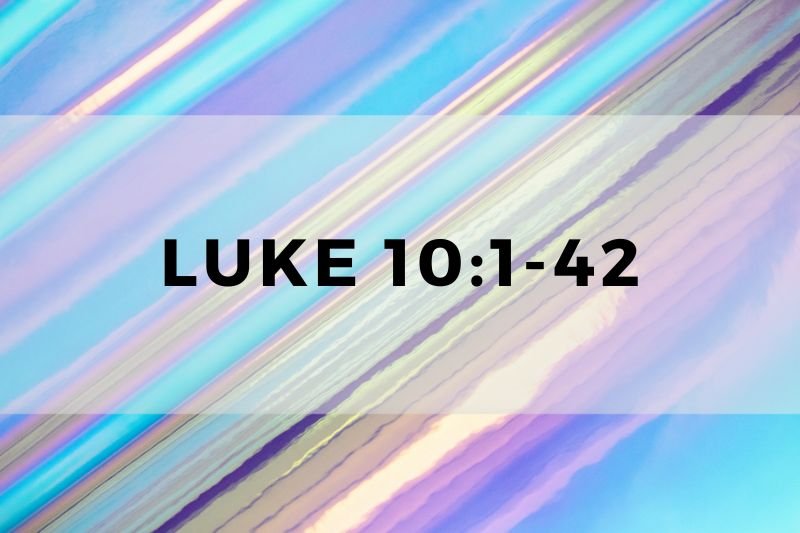
Luke 10:1-42
1 After this the Lord appointed seventy-two others and sent them two by two ahead of him to every town and place where he was about to go. 2 He told them, “The harvest is plentiful, but the workers are few. Ask the Lord of the harvest, therefore, to send out workers into his harvest field. 3 Go! I am sending you out like lambs among wolves. 4 Do not take a purse or bag or sandals; and do not greet anyone on the road. 5 When you enter a house, first say, ‘Peace to this house.’ 6 If someone who promotes peace is there, your peace will rest on them; if not, it will return to you. 7 Stay there, eating and drinking whatever they give you, for the worker deserves his wages. Do not move around from house to house. 8 When you enter a town and are welcomed, eat what is offered to you. 9 Heal the sick who are there and tell them, ‘The kingdom of God has come near to you.’ 10 But when you enter a town and are not welcomed, go into its streets and say, 11 ‘Even the dust of your town we wipe from our feet as a warning to you. Yet be sure of this: The kingdom of God has come near.’ 12 I tell you, it will be more bearable on that day for Sodom than for that town. 13 “Woe to you, Chorazin! Woe to you, Bethsaida! For if the miracles that were performed in you had been performed in Tyre and Sidon, they would have repented long ago, sitting in sackcloth and ashes. 14 But it will be more bearable for Tyre and Sidon at the judgment than for you. 15 And you, Capernaum, will you be lifted to the heavens? No, you will go down to Hades. 16 “Whoever listens to you listens to me; whoever rejects you rejects me; but whoever rejects me rejects him who sent me.” 17 The seventy-two returned with joy and said, “Lord, even the demons submit to us in your name.” 18 He replied, “I saw Satan fall like lightning from heaven. 19 I have given you authority to trample on snakes and scorpions and to overcome all the power of the enemy; nothing will harm you. 20 However, do not rejoice that the spirits submit to you, but rejoice that your names are written in heaven.” 21 At that time Jesus, full of joy through the Holy Spirit, said, “I praise you, Father, Lord of heaven and earth, because you have hidden these things from the wise and learned, and revealed them to little children. Yes, Father, for this is what you were pleased to do. 22 “All things have been committed to me by my Father. No one knows who the Son is except the Father, and no one knows who the Father is except the Son and those to whom the Son chooses to reveal him.” 23 Then he turned to his disciples and said privately, “Blessed are the eyes that see what you see. 24 For I tell you that many prophets and kings wanted to see what you see but did not see it, and to hear what you hear but did not hear it.” 25 On one occasion an expert in the law stood up to test Jesus. “Teacher,” he asked, “what must I do to inherit eternal life?” 26 “What is written in the Law?” he replied. “How do you read it?” 27 He answered, “‘Love the Lord your God with all your heart and with all your soul and with all your strength and with all your mind’; and, ‘Love your neighbor as yourself.'” 28 “You have answered correctly,” Jesus replied. “Do this and you will live.” 29 But he wanted to justify himself, so he asked Jesus, “And who is my neighbor?” 30 In reply Jesus said: “A man was going down from Jerusalem to Jericho, when he was attacked by robbers. They stripped him of his clothes, beat him and went away, leaving him half dead. 31 A priest happened to be going down the same road, and when he saw the man, he passed by on the other side. 32 So too, a Levite, when he came to the place and saw him, passed by on the other side. 33 But a Samaritan, as he traveled, came where the man was; and when he saw him, he took pity on him. 34 He went to him and bandaged his wounds, pouring on oil and wine. Then he put the man on his own donkey, brought him to an inn and took care of him. 35 The next day he took out two denarii and gave them to the innkeeper. ‘Look after him,’ he said, ‘and when I return, I will reimburse you for any extra expense you may have.’ 36 “Which of these three do you think was a neighbor to the man who fell into the hands of robbers?” 37 The expert in the law replied, “The one who had mercy on him.” Jesus told him, “Go and do likewise.” 38 As Jesus and his disciples were on their way, he came to a village where a woman named Martha opened her home to him. 39 She had a sister called Mary, who sat at the Lord’s feet listening to what he said. 40 But Martha was distracted by all the preparations that had to be made. She came to him and asked, “Lord, don’t you care that my sister has left me to do the work by myself? Tell her to help me!” 41 “Martha, Martha,” the Lord answered, “you are worried and upset about many things, 42 but few things are needed—or indeed only one. Mary has chosen what is better, and it will not be taken away from her.”
Luke 10:1-42: Verse-by-Verse Analysis
Verse 1: Jesus appoints seventy-two disciples and sends them out in pairs. This shows the importance of teamwork in ministry.
Verse 2: Jesus emphasizes the need for more workers in God’s mission. He instructs them to pray for more laborers.
Verse 3: Jesus warns them of the dangers they will face, comparing them to lambs among wolves. This highlights the perilous nature of their mission.
Verse 4: They are to travel light and not be distracted by social customs. This signifies reliance on God and urgency in their mission.
Verse 5: They are to offer peace to each house they enter. This peace is a blessing and a test of receptivity.
Verse 6: If the household is receptive, the peace will remain. If not, it will return to the disciples. This shows the conditional nature of God’s blessings.
Verse 7: They are to stay in one house and accept hospitality. This teaches contentment and respect for the host’s generosity.
Verse 8: They should accept whatever food is offered. This shows cultural sensitivity and gratitude.
Verse 9: They are to heal the sick and proclaim the nearness of God’s kingdom. This combines physical and spiritual ministry.
Verse 10: If a town rejects them, they are to make a public declaration. This serves as a warning to the town.
Verse 11: Shaking off the dust is a symbolic act of judgment. Yet, they must still proclaim the kingdom’s nearness.
Verse 12: Jesus warns that rejecting the message will bring severe judgment, worse than that of Sodom.
Verse 13: Jesus condemns Chorazin and Bethsaida for their unrepentance despite witnessing miracles. This highlights the gravity of rejecting divine signs.
Verse 14: Tyre and Sidon, known for their wickedness, will fare better in judgment than these unrepentant towns.
Verse 15: Capernaum, despite its privileges, will face severe judgment. This underscores the responsibility that comes with greater revelation.
Verse 16: Accepting or rejecting the disciples is equivalent to accepting or rejecting Jesus and God. This shows the authority given to the disciples.
Verse 17: The seventy-two return joyfully, reporting their success over demons. This indicates the power of Jesus’ name.
Verse 18: Jesus speaks of seeing Satan fall, symbolizing the defeat of evil. This is a prophetic vision of victory.
Verse 19: Jesus grants them authority over harmful creatures and the enemy’s power. This assures divine protection.
Verse 20: They should rejoice not in their power but in their salvation. This shifts focus from earthly success to eternal security.
Verse 21: Jesus praises God for revealing truths to the humble, not the wise. This shows God’s preference for childlike faith.
Verse 22: Jesus declares his unique relationship with the Father. This emphasizes his divine authority and the exclusivity of revelation.
Verse 23: Jesus privately blesses his disciples for their privileged experience. This highlights the value of witnessing divine acts.
Verse 24: Many desired to see and hear what the disciples did but couldn’t. This underscores the unique blessing of their time with Jesus.
Verse 25: A lawyer tests Jesus with a question about eternal life. This sets the stage for the parable of the Good Samaritan.
Verse 26: Jesus redirects the question to the Law, asking for the lawyer’s interpretation. This engages the lawyer in self-reflection.
Verse 27: The lawyer cites the commandments to love God and neighbor. This summarizes the essence of the Law.
Verse 28: Jesus affirms the lawyer’s answer and instructs him to live by it. This emphasizes the importance of action.
Verse 29: Seeking to justify himself, the lawyer asks, “Who is my neighbor?” This question prompts the parable.
Verse 30: Jesus begins the parable with a man attacked by robbers. This sets up the scenario for teaching about compassion.
Verse 31: A priest sees the man but passes by. This highlights religious indifference.
Verse 32: A Levite also passes by without helping. This further emphasizes the failure of religious leaders.
Verse 33: A Samaritan, despite cultural enmity, shows compassion. This challenges prejudices and exemplifies true neighborliness.
Verse 34: The Samaritan tends to the man’s wounds and takes him to an inn. This demonstrates practical love and care.
Verse 35: He pays for the man’s care and promises further support. This shows sacrificial generosity.
Verse 36: Jesus asks who was the true neighbor. This question leads to self-examination.
Verse 37: The lawyer identifies the merciful Samaritan. Jesus instructs him to “go and do likewise,” emphasizing action over knowledge.
Verse 38: Jesus visits Martha’s home. This introduces the story of Martha and Mary.
Verse 39: Mary listens to Jesus, prioritizing his teaching. This shows devotion and attentiveness.
Verse 40: Martha is distracted by preparations and complains to Jesus. This highlights the tension between service and devotion.
Verse 41: Jesus gently rebukes Martha for her worries. This teaches the importance of focusing on what truly matters.
Verse 42: Jesus commends Mary for choosing the better part. This underscores the value of spiritual over material concerns.
